

| June 2008 "It's just paper - all I own is a pickup truck and a little Wal-Mart stock." ~Sam Walton |
| The Professional Opinion S&P 500 Index: 1400.38 General The timing model remains very favorable as summer approaches. Critical areas are examined this month. Economic Growth Real GDP is estimated to stay within a range of 1-2% for the rest of 2008. Fed interest rate cuts, the economic stimulus package will start having an effect in the second half of the year. Dollar weakness continues to fuel US exports and provide a bright spot in an otherwise lackluster economy. New jobs are expected to remain weak until the economy begins its slow turnaround later on this year. Housing starts have declined 30% and change YOY, which is now close to the recession lows during the 70's. Housing prices are down 8% YOY and are expected to remain soft until excess inventories are sold off. Real GDP grown for 2009 is expected to be within a range of 2-3%. The market is expected to continue trending upward until new highs are reached above the S&P Index October 2007 closing high of 1565.15. The target range for late 2008, 2009 is still expected to range of 1600. The Fed The Fed meets June 24-25 and rates are expected to remain unchanged at 2%. This 2% rate is below the current YOY inflation rate of 3.9%, based on the CPI. It is also below the PCE (Personal Consumption Index), which is 3.2%. This translates into a negative fed funds rate when adjusted for inflation, which translated into an improved economic growth rate for the rest of 2008 and into 2009. (I understand part of this but I don't quite get why a negative funds rate is a positive for the economy. ) The Fed is not expected to do much more due to the fact that this is an election season and it typically tries to remain neutral. It should have accomplished all it needed to in regards to economic stimulation the first five months of the year and is expected to sit it out until the soap opera that is the democratic primaries, has concluded. Inflation Core inflation has behaved quite well in the face of high energy prices. The consumer price energy index has risen 15.9% YOY and gasoline has risen 20.7%. Rising energy prices serve as a tax on the consumer which has the effect of restraining inflation. There is an exception and that is in the transportation sector, where cost has risen 7.2% due to higher fuel costs. As long as real GDP growth remains below its average rate of 3 - 3.5%, inflation is likely to remain at or below current levels, which is also helped out by the current low labor rate costs. Bob remains vigilant regarding legitimate concerns, which would be when real GDP growth meets or exceeds the normal long term growth rate of 3 - 3.5%. The good news is that this isn't likely to happen anytime soon. The reason this is important is because inflation has an impact on what investors are willing to pay for future corporate earnings. Portfolios No changes to portfolios. Summary Bob expects the S&P Index to reach historic highs in the 1600 range by 2009. He also expects to see more market volatility, driven in part by the sluggish economy and by current housing woes. Buy on weakness in the low 1300's. All portfolios remain fully invested. |
 |
| There's
First Class..... and then there is a ride on the Corporate Jet. Only one problem - It's going north instead of south. Can't complain though, I could instead be experiencing the latest No Frills Flight. Pete was right. There is more to the Yukon than tar sands and power plants. This time I got to learn about Muskeg. |
Personal
Portfolio
RNIN and SIMG continue to impress: 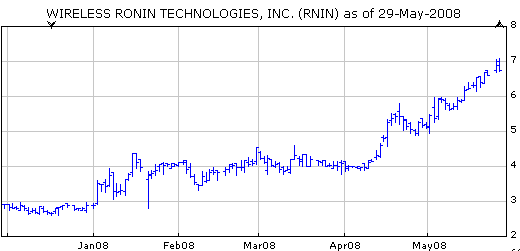 I ended up selling the rest of RNIN because I thought the share price would not be sustained at its current levels. It is still climbing, of course. The proceeds went to increasing holdings in three other stocks: 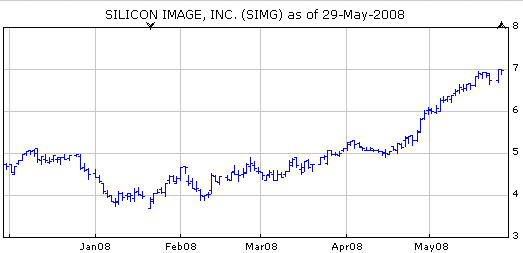 SIMG has been behaving quite nicely. Some of the conventional thinking on this is that it is still a cheap stock. People armed with economic stimulus checks are going to be buying lots of LCD tv's and other electronics that SIMG makes parts for. That big bounce has me almost over the 4-5% limit for any one stock so with any luck, I may be able to take some nice profits this month. 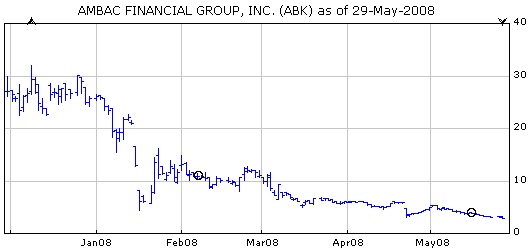 I couldn't resist and picked up some more ABK shares in the low 3's. Part of the reason was that it was really cheap and the other was that ABK is actually issuing a dividend. A whopping penny a share and you can set it up to reinvest in more shares! How is all this going to pan out? Who knows. ABK leadership seems quite optimistic about the future. I don't know enough about the bond insuring industry to consider this anything more than a spin on the roulette wheel. 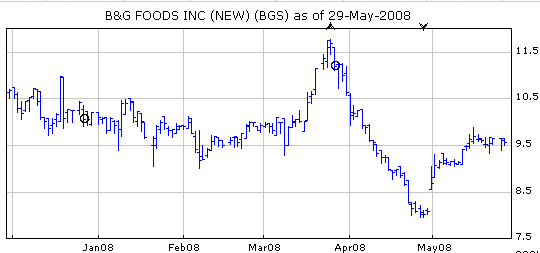 The last RNIN proceeds went into BGS at @ 8.50 a share. This stock has a killer dividend and it can also be reinvested in more shares. If you have a Schwab account, you can right click on the stock and there is an option for reinvesting the dividends in more shares. It is not so much that I am on a dividend kick lately but more of parking money in stocks where I think individual stock performance might do just a bit better than the mutual funds in this slow growth climate. Since these stocks are in retirement accounts, I don't care about the tax consequences of distributions. ITW DRIP Registration - Part II My form complete with DTC number arrived two weeks later. I didn't get a share certificate in the usual sense. It was a piece of paper which stated I owned three shares of ITW in a ComputerShare account. Now, how to establish a drip plan............... Looking over the form there is nothing to indicate that this has anything to do do with establishing a DRIP Account. I can either buy, sell or transfer my three shares. Not what I want. There is a new 1-888 number on the form and I try that. As is per the norm, none of the options in voice mail hell have anything to do with what I want to do which is establish a DRIP account. So how does one get a real live person on the phone? Do nothing. Most of these automated systems will transfer a call to a live person after 3-5 attempts to get you to choose an option. Must have something to do with persons with disabilities. Several minutes later I got a live person and explained what I wanted. She asked for my account number, verified that I owned three shares of ITW and said to look for the paperwork in 7-10 business days - in other words, two more weeks. To be Continued.... Question of the Month - Adam Bold and the Mutual Fund Store The above actually ties in quite nicely with two questions I received concerning Adam Bold and his Mutual Fund Store. Is it worth it? Well, that depends. The Show and the Service Adam Bold has a weekly radio show called the Mutual Fund Store which runs for an hour on Saturdays. The show features calls for the most part, about mutual funds and other financial instruments. He encourages the use of no-load mutual funds, despises annuities and discourages direct stock ownership, as well as index funds. He also has a Mutual Fund Store franchise where a client can have his money managed for a fee, using Adam Bold's mutual fund picks. The minimum about required is 50K. The fee charged is a percentage of your account balance and it is based on a sliding scale. The less you have invested, the higher the fee. 50K accounts run around 1% (I think). The more you have invested, the lower the fee. I think the lowest fees are around .5% per year. Another term for the charge fee is a 'Wrap' fee. Adam Bold's pitch is in essence, 'The more money we make for you, the more we make for ourselves.' There is another service which can be purchased for those who don't have 50k of assets called Smart 401k which runs about $250.00 for a year. You supply the service with the funds you have access to in your retirement account and the vice will tell you which funds to invest in. What does Adam Bold think about timing the market? He believes in general that it cannot be done and does not see a time when going to cash is ever in the cards. His fund selections would be different in differing economic cycles, but you would stay in mutual funds. I of course disagree with that. Bob Brinker's timing model got me out of the market at an optimum time and back into the market at another optimum time. It can be done. How about index funds....what does Adam Bold think of them? He doesn't. He prefers to find funds that consistently beat the market on a YOY basis. Why settle for something that merely mimics the major indexes when you can you can achieve better performance which managed funds. The other side of the argument is that 90% of the funds out there do not beat their indexes so why go through the hassle of attempting to find funds that do. Index funds are low cost and return whatever their respective indexes do. I would be very interested in seeing how his portfolio selections actually perform in the aggregate. Adam Bold's opinion on direct stock ownership. Adam thinks that unless you are a multi-millionaire several times over, individual stocks are not for you because odds are you will not be adequately diversified and end up hurting yourself in the long run. I agree and disagree. While I think diversification is an issue which is very important and one which people tend to take too lightly, the jaded side of me also notes that every dollar in direct stock ownership is a dollar which Adam Bold's Mutual Fund Store cannot take a piece of. What about Mutual Fund Expenses? Adam Bold deals with no-load funds or funds with the load waived. I think he is a too little cavalier with fund operating expenses. His opinion seems to be that operating expenses don't matter if the fund is delivering superior results to its peers. In an ideal investing environnment that is all well and good. Suppose however, that one of your holdings is an international fund with an expense ratio of 3% and the market treads water for a year. Suppose the fund did 5% total return for the year, expenses were 3% and net gain was 2%. If you factored inflation into the mix - you lost 1 - 1.5% on your investment for the year. A fund with signifacantly lower expenses might shown a slight gain. Snippets of what other people think of Adam Bold 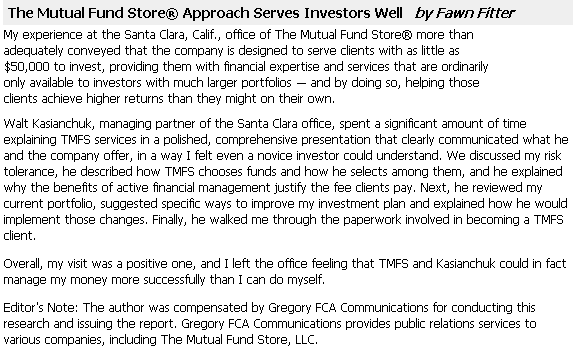 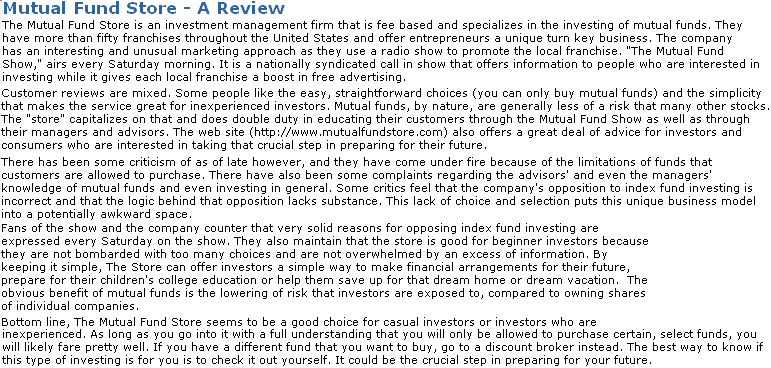 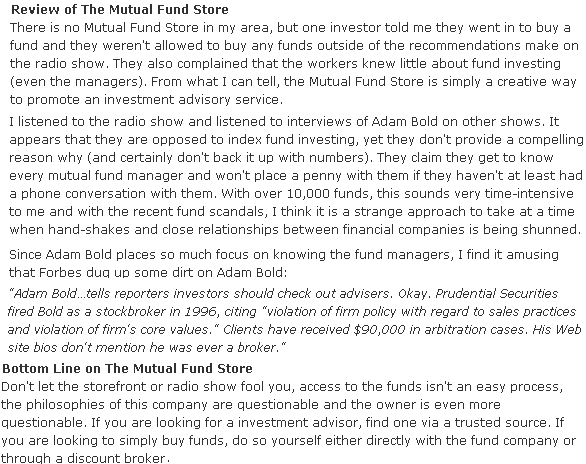
Conclusion I think on balance Adam Bold does a lot of good, particularly in steering callers away from predatory salesmen who are more interested in lining their own pockets than in helping you grow your assets. If you don't feel comfortable managing your own assets, don't have the time or inclination and wish to have someone do that for you, I think the service is worth considering. I would put his service at above average and on balance it would do more good than harm. The caveat to this is I have not seen any actual performance numbers for his portfolios so that would be something look long and hard at. Performance should be net of all fees. There have been several calls into the radio show asking this same question. The answer is generally one which says that since each account is individually managed and each person has differing risk tolerance etc., it is hard to answer the question. Visit the store and you will be provided with some past performance numbers for portfolios which would be close to your individual situation. |
|||||
